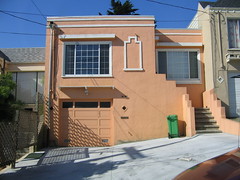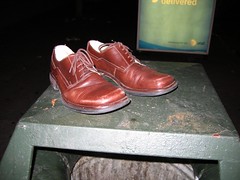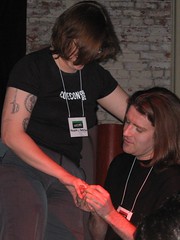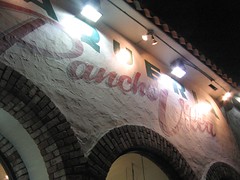I woke up to a breakfast of pancakes, cooked by the wonderful
![[info]](http://stat.livejournal.com/img/userinfo.gif) riseorbleed
riseorbleed. I don't know about you but waking up to a hot breakfast is heavenly. After some morning ablutions, we hailed a cab and along the way we chatted with the cabbie as I looked out the window. Luxor cabbies are really nice, every time I travelled with them, they had some interesting story to tell and big, broad smiles. Smiling is the way to fatter tips!
The weather in San Francisco is supposed to be rather variable. You know how that is, rain one minute and then sun the next. Well, the entire time I was there, it was bright and sunny and gorgeous. San Francisco really put on her best to charm me and she really succeeded. I didn't think that postcard-perfect pictures were possible, but I saw them
everywhere.
I was happy to walk around without needing a winter coat. And everyone else smirked at how happy I was.
Daniel seemed to have recovered from the previous night's revelry. His talk on
delta was excellent because he's a very good public speaker. Which is good, because he gave two presentations at CodeCon. When I talked to him on Thursday night, he seemed a little embarassed at how successful
delta had become since it such a simple piece of software. But people like GCC use it to fare down their bug reports to the lines of code that reproduce its bugs.
Rob and Tristan sidled up to my bar and asked me if I could get them some juice. For their laptops. They were working on their presentation all the way until the last minute, which involved a drunken Tristan stumbling around on stage. Except that Tristan doesn't drink, so his imitation was quite poor. They were presenting
Djinni, which is their implementation of a fast simulated-annealing algorithm that takes also pressure into account. Sadly, they didn't
explain their algorithm but their talk was entertaining nevertheless.
At lunch, Spider snuck me out of the building and she showed me around San Francisco. She pointed out the
Eagle Tavern with a glimmer in her eye. I think she's trying to corrupt me. Or she's trying to
pimp me out. Then we went to
Stompers where she tried on some boots. We were stymied, however, by the fact that a very annoying woman and her husband were trying on every single pair of boots in the entire store.
iGlance is a real-world video-conferencing and screen-sharing application that has some fairly good usability
built into it. It also has a fairly sensible privacy model and does some NAT punching to boot. Although it's only got a Win32 port for now, it's free software so someone will fix it up.
Sometime in the afternoon, the beautiful and fair
![[info]](http://stat.livejournal.com/img/userinfo.gif) wealhtheow
wealhtheow came behind the bar and surprised me with a hug and a
sandwich! I was happy with the random hug from a new friend, but the sandwich was wonderful. I had not eaten lunch on Friday so I was very grateful. She put a huge smile on my face.
I munched on the sandwich while listening to the
OASIS talk. This technology is a
locality-aware server-selection resolver, which is pretty good for distributing servers around the world and finding the fastest one. They implement this as a DNS redirector so that lookups are transparent to normal Internet software. This made me feel a little bad for
![[info]](http://stat.livejournal.com/img/userinfo.gif) holdenk
holdenk, whose SelfDirectedProject happens to be on a very similar topic. It does, however, validate his approach.
![[info]](http://stat.livejournal.com/img/userinfo.gif) maradydd
maradydd's presentation about
Query by Example was up next. She did a very good introduction to data-mining, which segued into her
hack on PostgreSQL where you can specify examples of things you want to search for. That is not how SQL normally works, where you specify constraints. With QBE, you just specify things similiar to what you want, and things similar to what you don't want.
I was chatting with Rob Pascual when I noticed Len lining up in the Q&A; queue. Suddenly, my ears perked up as I sensed something important was going to happen. So I pulled out my camera, stepped on some toes, and got into position. When it was his turn at the microphone, he started saying random stuff that wasn't question at all! Something cheesy like how Meredith had changed his life and how he wanted to be with her. Then he got up on stage and asked
The Question.
It was beautiful. The audience broke out into cheers and applause, except for the heartless bastards beside me. But who cares about them? This was such an awesome occurance that
an interview was taped.
After teardown, some people were going to head to a franchise Mexican restaurant. Spider insisted that I get real food, so we walked down to the Mission. We made a detour to
Good Vibrations which is a San Francisco landmark if ever there was one. I swear that she's trying to corrupt me. Anyway, as we were walking out, I must have mentioned that I was from Canada. Because Cohen, a Torontonian, came out of nowhere and introduced himself to us.
Well, what was I to do but to invite my fellow countryman to dinner? So we set off to find a Taqueria that served nopales. This failed since Californians don't seem to like eating cactus. Instead, we went to
Pancho Villa where I ate enchiladas and salsa verde and guacamole and churros and I was so very happy!
We bid farewell to Cohen after exchanging contact information and tried to find everyone else. Unfortunately, we couldn't reach anyone by cellphone, so we sat around dejected for a while. Then we realised that we could go to
Annie's Social Club where an event was happening. This turned out to be a good and a bad idea.
It was a good idea because we found everyone at CodeCon. It was a bad idea because Annie's Social Club double-booked us with
bad karaoke! And then were quite rude when we complained. And then kicked out John Gilmore. So I just want to say that
Annie's Social Club hates geeks and freedom. So Len hailed a black stretch limousine, we all climbed into it, invited
some reporters along and moved the entire party to the XYZ bar.
The XYZ staff were very awesome, accommodating an extra hundred patrons and getting an extra bartender. And they were very nice about it. Unfortunately, the bar was full, so I had to lead a bunch of introverts in the fine art of taking over an establishment. We walked in, started talking, I encouraged people to sit down in empty spots on the couches. They did a very admirable job of taking over the back.
I got the stunningly adorable
![[info]](http://stat.livejournal.com/img/userinfo.gif) akashayi
akashayi a seat and a drink, before I taked to the people sitting with us. They were a couple who had moved from Florida to San Francisco, and a man from New York who was quite the boor. The man in the couple knew the New Yorker and seemed quite embarassed about him. After twenty minutes of conversation, they excused themselves and bid us good night. This gave us plenty of seating space to talk about geeky things until the manager kindly kicked us out.
I made sure Akasha got safely to her hostel and then took a taxi back to the guest room. It was quite the challenge to direct the cab driver, since I had lost the directions back, but I managed!
 Lucas pointed that the Package Tracking System now links to Ubuntu bug reports in Launchpad, for Debian packages.
This is of course an interresting feature, which I immediately tried on geneweb, my pet package.
Indeed, the only bug I found there comes from a user who was
apparently not able to read a damn README.Debian file, which nicely
explains what people are expected to do if they want to share the
genealogical databases with Geneweb with the system-wide daemon. Maybe
they should renamed README.Debian to
README.Debian-but-readme-also-if-you-use-Ubuntu.
In short, the only bug is user error. Now I really wonder how I could close that thing (yes, I did log in into Launchpad) and be able to claim that I have zero bugs on my pet package.
I should do the same for samba, but I guess that Steve Langasek is more or less monitoring things there (LP is apparently Yet Another Thing You Have To Be Online To Use, which is a no-no for me).
Lucas pointed that the Package Tracking System now links to Ubuntu bug reports in Launchpad, for Debian packages.
This is of course an interresting feature, which I immediately tried on geneweb, my pet package.
Indeed, the only bug I found there comes from a user who was
apparently not able to read a damn README.Debian file, which nicely
explains what people are expected to do if they want to share the
genealogical databases with Geneweb with the system-wide daemon. Maybe
they should renamed README.Debian to
README.Debian-but-readme-also-if-you-use-Ubuntu.
In short, the only bug is user error. Now I really wonder how I could close that thing (yes, I did log in into Launchpad) and be able to claim that I have zero bugs on my pet package.
I should do the same for samba, but I guess that Steve Langasek is more or less monitoring things there (LP is apparently Yet Another Thing You Have To Be Online To Use, which is a no-no for me).
 I was checking my mail and saw a message to
I was checking my mail and saw a message to 


